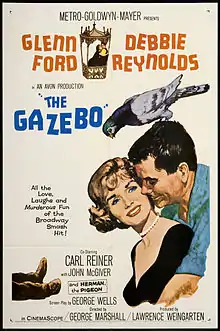The Gazebo
The Gazebo is a 1959 American black comedy CinemaScope film about a married couple who are being blackmailed. It was based on the 1958 play of the same name by Alec Coppel and directed by George Marshall. Helen Rose was nominated for the Academy Award for Best Costume Design, Black-and-White. According to MGM financial records, the film earned $1,860,000 in North America and $1,450,000 elsewhere, making a profit of $628,000. It is also the last film released by MGM in the 1950s.[1]
- For the play by Alec Coppel, see The Gazebo (play) and for the painting by Caspar David Friedrich, see The Gazebo (painting).
| The Gazebo | |
|---|---|
 | |
| Directed by | George Marshall |
| Produced by | Lawrence Weingarten |
| Screenplay by | George Wells |
| Story by | Myra Coppel Alec Coppel |
| Based on | The Gazebo 1958 play by Alec Coppel Frederick Brisson |
| Starring | Glenn Ford Debbie Reynolds Carl Reiner John McGiver |
| Music by | Jeff Alexander |
| Cinematography | Paul Vogel |
| Edited by | Adrienne Fazan |
| Distributed by | Metro-Goldwyn-Mayer |
Release date |
|
Running time | 100 minutes |
| Country | United States |
| Language | English |
| Budget | $1,218,000[1] |
| Box office | $3.31 million[1] |
Plot
Television writer and director Elliott Nash (Glenn Ford) is being blackmailed by Dan Shelby (voice of Stanley Adams) over nude photographs of his wife Nell (Debbie Reynolds), taken when she was 18 years old. Elliott does not inform Nell, the star of a Broadway musical, what is going on, but works feverishly to make enough money to pay off the ever-increasing demands.
Finally, Elliott decides that murder is the only way out. He makes preparations, incorporating some advice from a friend, District Attorney Harlow Edison (Carl Reiner). When the blackmailer shows up at the Nashes' suburban home as arranged to collect his latest payment, Elliott shoots him, then hides the body in the concrete foundation being poured for the antique gazebo his wife has bought, wrapped in the shower curtains from his bathroom. He has to keep Sam Thorpe (John McGiver), the contractor hired to install the structure, and Miss Chandler (Mabel Albertson), the real estate agent trying to sell the Nashes' house, from stumbling across his scheme.
Then, Harlow brings news that Shelby has been shot and killed ... in his hotel room, leaving Elliott wondering who he murdered. Nell's name is on a list of blackmail victims belonging to Shelby, so both Elliott and she are suspects. (As it turns out, Shelby approached Nell first, but was rejected; the publicity would have greatly boosted the musical's audience.) They are cleared when the murder weapon is found to belong to Joe the Black, an associate of Shelby's. It is clear to Lieutenant Jenkins (Bert Freed) that Joe decided not to split the money. Elliott is relieved to discover his victim was a criminal.
However, two others were in the gang. The Duke (Martin Landau) and Louis the Louse (Dick Wessel) kidnap Nell and take her to her home. They followed Joe the Black to the Nash house, and know he did not come out. They want the briefcase (containing $100,000) with which he was planning to disappear. They eventually figure out that the body is in the gazebo's foundation, now crumbling due to unexpected rain. They bring the body, wrapped in the shower curtains, into the Nash living room, find the briefcase and leave. When Elliott gets home, he unties his wife and confesses what he has done, moving the body to the guest bedroom over the garage.
While they are trying to figure out what to do next, Lieutenant Jenkins shows up with his prisoners, the Duke and Louis. From what they have told him, Jenkins is sure that Elliott is a murderer. Just as Elliott is about to confess, he sees that the bullet he fired missed Joe and ended up lodged in a book. A doctor confirms that Joe actually died of a pre-existing heart problem, and Elliott's pet pigeon Herman flies off with the bullet, so no evidence ties him to the death.
Cast
- Glenn Ford as Elliott Nash
- Debbie Reynolds as Nell Nash
- Carl Reiner as Harlow Edison
- John McGiver as Sam Thorpe
- Mabel Albertson as Miss Chandler
- Doro Merande as Matilda, the Nashes' servant
- Bert Freed as Lieutenant Joe Jenkins
- Martin Landau as The Duke
- Robert Ellenstein as Ben
- Dick Wessel as Louis the Louse (as Richard Wessel)
- James Gavin as Sgt. Drucker (uncredited)
- Stanley Adams as Dan Shelby, the blackmailer (uncredited)
- Harlan Warde as Dr Bradley (uncredited)
- ZaSu Pitts as Mrs MacGruder (scenes deleted)
- James Kirkwood Sr. as Mr MacGruder (scenes deleted)
Production
A comic subplot involves Alfred Hitchcock inadvertently assisting Elliott in a murder plan via telephone, while checking on a script Nash is writing for him. The play's author Alec Coppel had written such a script for Hitchcock's film Vertigo.[2]
See also
References
- 'The Eddie Mannix Ledger’, Margaret Herrick Library, Center for Motion Picture Study, Los Angeles
- Spoto, Donald. The Dark Side of Genius: The Life of Alfred Hitchcock. p. 386. ISBN 0-316-80723-0
External links
| Wikimedia Commons has media related to The Gazebo. |
- The Gazebo at the Internet Broadway Database
- The Gazebo at IMDb
- The Gazebo at the TCM Movie Database
- The Gazebo at AllMovie
- The Gazebo at the American Film Institute Catalog